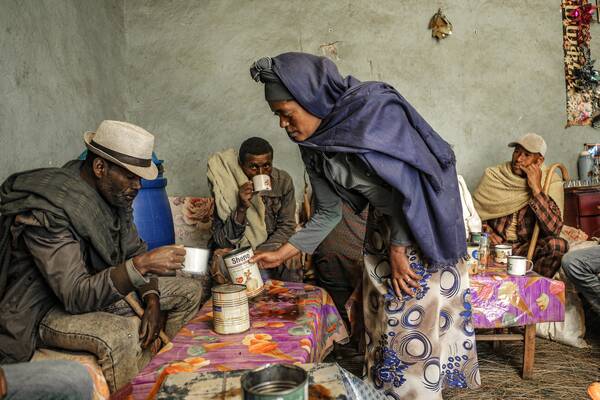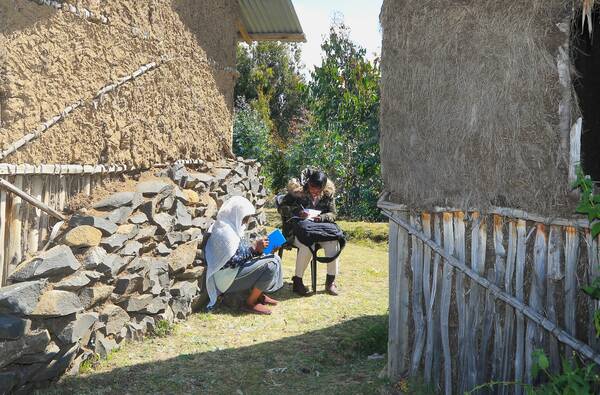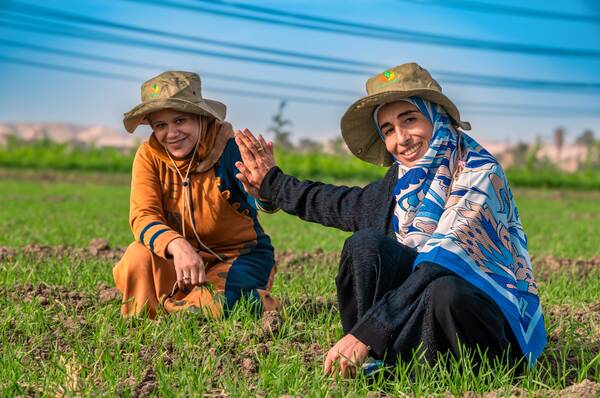Investing in Women, Inspiring Inclusion, Strengthening Climate Resilience

In line with the theme for International Women's Day 2024, "Invest in Women, Accelerate Progress," Researchers from ICARDA and Western University, Canada, under the auspices of the CGIAR Initiative, HER+, which aims to achieve climate resilience through gender equality and social inclusion in Global South food systems, take stock of public policies and local governance mechanisms that improve women's participation in climate governance and increase women's resilience in the hard-hit agricultural regions of the Global South.
Implementing targeted agricultural climate policies that prioritize women's access to resources, such as land tenure rights and climate-smart technologies, is essential for improving food security and fostering sustainable livelihoods in vulnerable communities. This is the shared conclusion of two new ICARDA studies that focus on diverse aspects of public policies and local governance mechanisms to better understand how they can drive improved outcomes and participation for women in climate governance, especially in the vulnerable agrifood sector.
Women face disproportionate impacts and unique barriers when it comes to climate change and food insecurity. Overlooked in current agricultural frameworks and market functions and marginalized or excluded from decision-making processes, they frequently have less access to the resources and services they need to be climate resilient than their male counterparts. This includes access to communal and household resources, including productive land, fertilizers, information, and seeds.
ICARDA's new 2030 Research and Innovation Strategy recognizes that women engaged in agriculture and pastoralism can become powerful agents for climate action when equipped with the tools and knowledge they need. Our cross-cutting research program on gender, equity, youth, and social inclusion seeks to address the constraints they face and create an enabling environment for women to have a more resilient and prosperous future. One way we are doing this is by investigating and promoting promising institutional mechanisms that promote equitable decision-making and resource allocation, for example, by strengthening local resource mobilization for more context-specific climate strategies and by promoting women's full and effective participation and leadership in the design, implementation, and evaluation of climate action plans.
Levelling up climate resilience through inclusive public policies

The first policy brief and evidence map – the result of a strategic literature review examines how public policies can be vital instruments to enhance women's resilience to climate change by driving inclusive socioeconomic and political change. This, in turn, can directly benefit women's ability to navigate climate and food insecurity challenges. For example, the equitable distribution of productive resources within an agricultural community, such as fertilizer, family labor at planting and harvest time, and mechanical tools that relieve drudgery, can improve women's productivity and resilience. Yet, as the study notes, if these policies are to be truly effective, women need to be able to fully participate in their development and implementation.
"Women need a seat and a voice at every climate-related decision-making table, whether it is at the UN Climate Change Conference or the community village meeting if the resulting investments, strategies, and implementation plans are to deliver climate resilience for women as well as men," says Dr. Dina Najjar, Senior Gender Scientist, ICARDA. "At the moment, women are under-represented at different levels of decision-making, but, as the review identified, there are examples of effective policy strategies that can accelerate change and strengthen women's participation in climate governance. Such strategies include the use of more progressive gender quotas at institutional and national levels," adds Kamaldeen Mohammed, PhD student and first author of the study.
Other examples of good practice cited in the review include policies that specifically prioritize women's access to targeted services, such as readily accessible credit and extension services, which increase their climate resilience and adaptive capabilities. Capacity-building programs that support women's economic empowerment, for example, by increasing their technical knowledge and financial literacy, also give them greater autonomy to respond to climate challenges.
Leveling the ground for climate-preparedness

The second policy brief and evidence map zoom into the community to focus on ways to amplify women's voices in collective climate adaptation and mitigation strategies at the local level to ensure that solutions address their specific and unique needs. One way to do this is by supporting women in becoming community leaders, giving them greater agency and influence to make and implement climate-related decisions in traditionally male-dominated cultures.
"It is at the community level where strategies turn into action, so local governance policies need to consider women as equal partners when it comes to making and implementing the decisions that affect them, which unfortunately is not always the case," explains Najjar. "The study shows that women can be effective leaders if they have access to the right information, resources, and training and are supported by policies that include social protection measures to help them break through gender norms. Examples in the study include women successfully leading agroecological interventions to increase climate resilience, such as intercropping, agroforestry, and mixed crop-livestock systems, that benefit not just women, but the whole community," notes Daniel Amoak, PhD student and first author of the study.
Recommendations highlighted in the resulting policy brief include women's participation in demand-led breeding programs to increase their access to climate-resilient seeds of the crops that are important to them, for example, those that are important for household nutrition. Other best practices highlighted include gender budgeting as a public financial instrument for investment in services that directly support women's empowerment, such as improved infrastructure and better access to climate and market information to inform decision-making, as well as supporting women to establish self-help groups to exchange knowledge and experiences. These groups also serve as a safe space for women to advocate for their rights and interests.
Investing in women for climate resilience

ICARDA, after forty years of experience working with partners on dryland system transformation, has seen first-hand that women on the front line of climate change are vulnerable. In response, as shared in these two new policy briefs, we have gathered evidence that inclusive public policy and local governance mechanisms for climate action are crucial drivers to accelerate change. On International Women's Day 2024, we join in the call to action to 'Invest in Women, Accelerate Change.'
- Mohammed, K., Najjar, D., & Bryan, E. (2022). Women's resilience and participation in climate governance in the agrifood sector: A strategic review of public policies. Beirut, Lebanon: International Center for Agricultural Research in the Dry Areas (ICARDA).
- Amoak, D., Najjar, D., & Kyle, J. (2022). Gender and Climate-relevant Agrifood Systems Governance: A Strategic Evidence Review. Beirut, Lebanon: International Center for Agricultural Research in the Dry Areas (ICARDA).
Authors:
- Kamaldeen Mohammed, PhD Student, Department of Geography and Environment, Western University, Canada
- Dina Najjar, Senior Gender Scientist, Social, Economics and Policy Research Group, ICARDA
- Elizabeth Bryan, Senior Scientist, International Food Policy Research Institute (IFPRI), Washington DC, USA
Authors:
- Daniel Amoak, Department of Geography & Environment, Western University, Canada
- Dina Najjar, Senior Gender Scientist, Social, Economics and Policy Research Group, ICARDA
